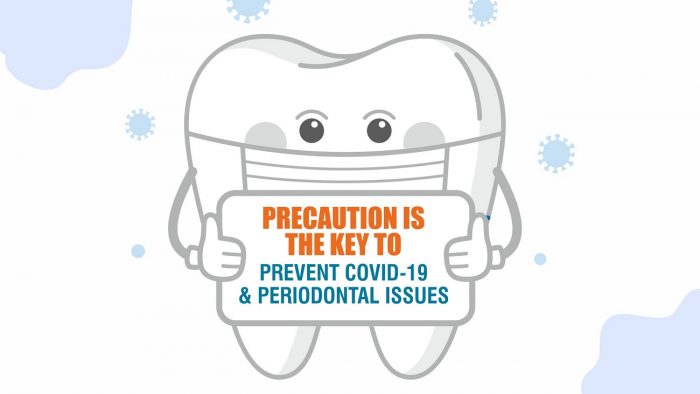Association Between COVID-19 And Periodontal Issues
May 20, 2021
The COVID-19 wave has taken the world by storm. And, one of the most perplexing things about the infection is that different people who get the disease show different symptoms. The intensity of the symptoms also differs from person to person. Typically, the most common symptoms experienced by people affected with COVID-19 are similar to common flu, including cough, fever, tiredness, etc.
The majority of the patients who have COVID-19 have mild symptoms and do not require hospitalisation. However, in some cases, the infection caused by the novel coronavirus affects different parts of the body. People who have comorbidities or other health issues like diabetes or periodontal disease, aka periodontitis, could be at a higher risk of developing severe COVID-19-related symptoms.
What is Periodontitis?
Periodontitis is a medical or clinical term used to denote severe oral infection caused due to bacteria accumulation in the gap between the teeth and the gums. Without immediate medical attention, the disease can have serious consequences; it can cause immense pain and even lead to tooth damage and tooth loss.
Link Between Periodontitis and COVID-19
Research conducted at McGill University in Montreal, Canada, finds a link between gum inflammation and COVID-19 complications and deaths. The study suggests that people who have periodontitis and develop COVID-19 symptoms are 8.8 times at a higher risk of dying.
In addition, people who have periodontal issues are 3.5 times more likely to require hospitalisation for COVID-19 and 4.5 times at a higher risk of facing breathing problems and may need ventilator support.
An article published in the New York Times in December 2020 suggests that many physicians and researchers who examined the health condition of the COVID-19 survivors found that many patients complained of oral issues like teeth becoming grey, sensitive and bleeding gums, tooth loss while undergoing COVID-19 treatment.
Although many dental care experts question the direct link between the novel coronavirus and periodontal issues, studies suggest the mouth could be the most vulnerable area to the virus because of the ACE2 (angiotensin-converting enzyme) receptor in oral tissues.
It is well-documented that the ACE2 reception is the target receptor of the coronavirus, and it serves as an entry point to the human cells. Apart from periodontitis, COVID-19 infection can lead to other oral manifestations, which are discussed below.
- Gingival inflammation
Inflammation and bleeding in the oral tissue among COVID-19 patients are usually due to the increased level of cytokines initiated by the novel coronavirus. Research suggests that periodontal disease could be one of the factors that increase the severity of COVID-19 symptoms.
- Dry Mouth
Dry mouth, which is also known by the clinical term, Xerostomia is one of the most common symptoms of COVID-19. This is usually caused by mouth .Research conducted at the American Dental Associated Science and Research Institute suggests that the novel coronavirus infection of the salivary glands can influence the quality and quantity of the saliva produced.
- Cracked teeth
In September 2020, an article published in New York Times claimed that since the start of the pandemic, dentists worldwide witnessed an increased number of patients complaining about cracked or fractured teeth. The article further claimed an increase in bruxism (teeth clenching) as one of the major causes of cracked teeth.
Scientists believe that the increase in bruxism could be related to two critical pandemic-related factors—first, the psychological stress caused by the lockdown measures and fear of getting infected by the virus. Second, sleep deprivation or sleep apnea.
Precaution is the key to prevent COVID-19 and Periodontal issues
One of the best ways to keep yourself safe from COVID-19 and periodontal problems is to follow preventive measures diligently. Ensure that you keep your face mask on when you step out of the home, wash your hands with soap and water and use sanitiser regularly.
Similarly, you can avoid periodontal issues by following a proper oral hygiene routine, including brushing your teeth twice a day, regular flossing, avoiding sweet food, and visiting the dentist for a complete oral examination at least once in six months.


















































